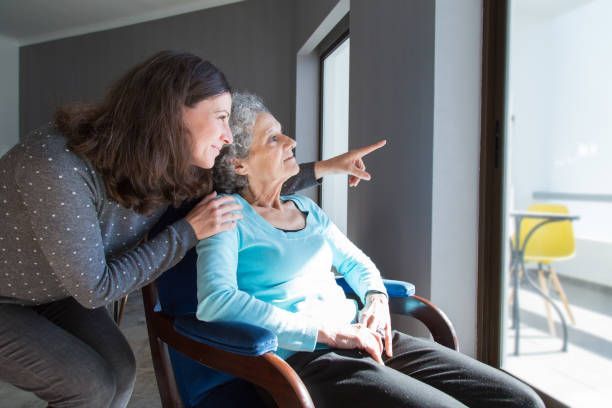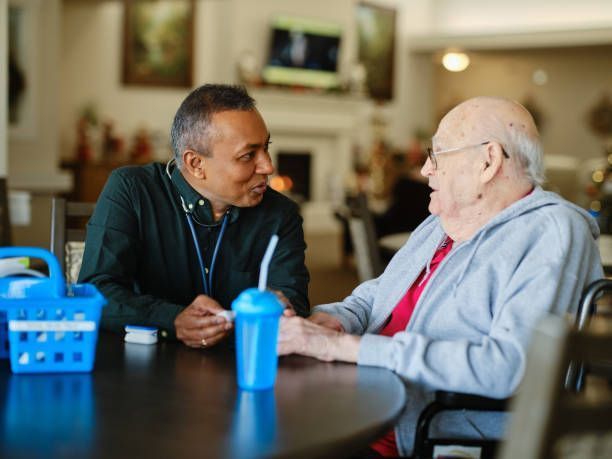
Providing the Same Level
of Care We Expect for
Our Own Family
(516) 408-0034
Understanding Sundown Syndrome: Tools for Effective Home Care
Understanding Sundown Syndrome:
Tools For Effective Home Care
Managing sundown syndrome is critical in home care services for individuals with dementia because it significantly impacts their safety, comfort, and overall well-being. Sundown syndrome, characterized by increased confusion, agitation, and restlessness during the late afternoon and evening, can lead to heightened anxiety and challenging behaviors. Having the knowledge and tools to effectively manage these symptoms allows home care providers to create a calm and structured environment, reducing the risk of accidents and emotional distress. With strategies such as establishing consistent routines, minimizing environmental triggers, and providing engaging activities, home health aides can alleviate the effects of sundown syndrome, ensuring a more peaceful and secure experience for both patients and their families. This specialized care is essential for maintaining the quality of life and emotional stability of individuals with dementia.

Are You Searching For a Home Care Agency Near Me
With Experience In Dementia Care and Sundowning?
As individuals age, they may experience a range of physical and cognitive changes that can impact their well-being. One such condition is sundown syndrome, also known as sundowning. Sundown syndrome refers to a group of symptoms that commonly occur in older adults with dementia during the late afternoon and evening hours. This phenomenon can pose significant challenges for caregivers, but with the right tools and strategies, it is possible to provide effective home care and support. 7 Day Home Care is experienced with in-home dementia care and is licensed by the New York State Department of Health to provide home care services in Manhattan, Queens, Brooklyn, Nassau County, and Suffolk County, New York.
What is Sundown Syndrome?
Sundown syndrome is characterized by a cluster of symptoms that typically manifest later in the day, often around sunset. While the exact cause is unknown, several theories suggest that factors such as hormonal imbalances, changes in the internal body clock, exhaustion, and sensory overload may contribute to its onset. The most common symptoms include increased confusion, anxiety,
restlessness, irritability, agitation, disorientation, and difficulty sleeping.
Understanding the Impact Sundowning
has on Family and Professional Caregivers
Sundown syndrome can be particularly challenging for family members and professional caregivers providing home care. The symptoms can lead to increased caregiver stress, communication difficulties, and a higher risk of accidents or wandering behaviors. Consequently, it is crucial to employ appropriate tools and strategies to manage and mitigate the impact of sundown syndrome.
Tools to Help Manage Sundown Syndrome
1.Establishing a Routine: Maintaining a consistent daily schedule can provide a sense of structure and security for individuals experiencing sundown syndrome. Consistency in meal times, medication schedules, and engaging activities can help regulate their internal body clock and reduce anxiety.
2. Adequate Lighting: Ensure that the living environment is well-lit during the late afternoon and evening hours. Dimming the lights as bedtime approaches may help signal the transition to nighttime, promoting better sleep patterns.
3. Calming Environment: Create a soothing atmosphere by minimizing noise, reducing clutter, and using comforting objects such as soft blankets or familiar photographs. This can help decrease sensory overload and promote relaxation.
4. Stimulating Activities: Engaging individuals in activities that promote cognitive stimulation during the daytime can help reduce restlessness and agitation later in the day. Puzzles, gentle exercises, listening to music, or reminiscing with photo albums are examples of activities that can be beneficial.
5. Avoiding Triggers: Identify and eliminate any factors that may trigger or exacerbate sundown syndrome symptoms. Common triggers include caffeine, certain medications, excessive noise, or excessive daytime napping.
6. Promoting Healthy Sleep Habits: Establish a calming bedtime routine, maintain a comfortable sleep environment, and ensure individuals get sufficient exercise during the day to promote better sleep quality at night.
7. Medication Management: Consult with healthcare professionals to determine if any medications could help manage sundown syndrome symptoms. However, it is essential to weigh the potential benefits against the risks of side effects or interactions.
8. Supportive Communication: Utilize effective communication techniques, such as maintaining a calm and reassuring tone, using simple and concise language, and providing visual cues, to enhance understanding and minimize frustration.
9. Caregiver Support: Caregivers should seek support from other family members, friends, or home care agencies to ensure they have time to rest and recharge. Attending support groups or seeking professional advice can provide valuable insights and coping strategies.
Sundown syndrome poses unique challenges for both individuals experiencing the condition and their caregivers. By understanding the symptoms and employing appropriate tools and strategies, home care providers can effectively manage sundown syndrome and create a supportive environment. Establishing routines, providing a calming atmosphere, engaging in stimulating activities, and promoting healthy sleep habits are among the many tools available to caregivers. Moreover, open communication, caregiver support, and professional guidance can make a significant difference in ensuring the well-being of individuals with sundown syndrome and maintaining a positive caregiving
experience.
An Experienced Home Care Agency Near You for Dementia Care
At 7 Day Home Care, our home health aides are thoroughly trained in dementia care and managing sundowning syndrome, ensuring the highest quality of support for individuals with cognitive impairments. Our caregivers are equipped with the skills and compassion needed to handle the unique challenges associated with dementia, including memory loss, confusion, and behavioral changes. They employ strategies to manage sundowning syndrome, a condition where individuals with dementia experience increased agitation and confusion during the late afternoon and evening. By creating structured routines, providing calming activities, and maintaining a safe and supportive environment, our aides help mitigate the effects of sundowning, promoting comfort and security. Serving Manhattan, Queens, Brooklyn, and Long Island, New York, 7 Day Home Care is dedicated to enhancing the well-being and quality of life for individuals with dementia through personalized, empathetic in-home care. To learn more about our dementia home care services near you, please call 516-408-0034 or visit 7 Day Home Care.
Brian Callahan
7 Day Home Care










Hours of Operation
We are Open 24 Hours a Day
7 Days a Week
All Rights Reserved | 7 Day Home Care | Created by DAR Web Consulting